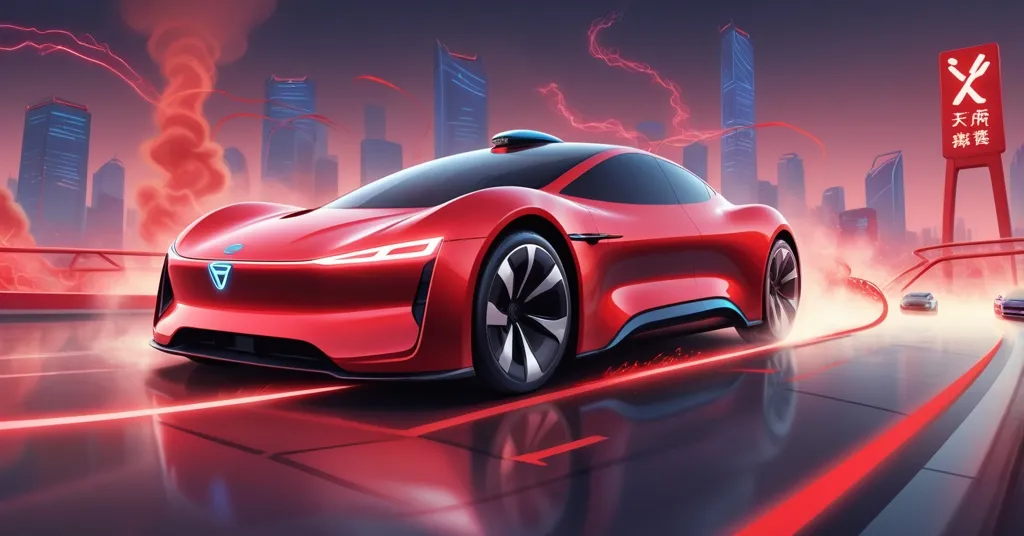US EV Industry Crashes: Investments Drop as China Surges Ahead in Clean Tech Race

US EV Sector Slams the Brakes: Investments Crash While Global Rivals Power Ahead
The US electric vehicle (EV) sector is skidding to a standstill under the Trump administration, with investments cratering and policy support being yanked out from under the industry’s wheels. As global EV sales hit record highs—mostly thanks to China’s unstoppable surge—American manufacturers are left spinning their tires, raising urgent questions about whether the US can still compete in the high-stakes race for clean, future-focused transportation. Worse, this isn’t just about cars; it’s about technological leadership slipping through our fingers.
- Investment Collapse: US EV investments plummeted by nearly a third to $8.1 billion in the three months before September, with $7 billion in planned projects scrapped.
- Policy U-Turn: Trump’s axing of EV tax benefits and emissions regulations reverses Biden-era support, gutting industry momentum.
- Global Divide: Worldwide EV sales soared to 2.1 million in September, led by China, while the US risks falling behind.
Policy Gut Punch: Why US EV Investments Tanked
Since Donald Trump returned to office in January, the US EV industry has taken a straight-up beating. Data from the US Clean Investment Monitor, compiled by Rhodium Group and MIT, shows investments in EV projects nosedived to $8.1 billion in the three months leading up to September—a drop of almost a third compared to last year. Even more brutal, $7 billion in planned investments were outright canceled between April and September. This isn’t random market turbulence; it’s the fallout from a deliberate policy reversal. Tax benefits that once made EVs more affordable for buyers? Gone. Regulations on greenhouse gas emissions that pushed automakers to go electric? Targeted for the scrap heap. This is a hard pivot from the Biden administration’s playbook, which leaned heavily on financial incentives and strict rules to drive EV adoption.
For the uninitiated, electric vehicles are battery-powered alternatives to the gasoline and diesel cars most of us grew up with—think Tesla Model 3 or Ford’s Mustang Mach-E. They’re a key piece of the puzzle in cutting carbon emissions and tackling climate change, but they come with sticker shock (often $10,000 more than comparable gas-powered cars) and infrastructure headaches like sparse charging stations. Government support—tax credits, subsidies, tight emissions laws—has been the grease keeping this transition moving. Without it, the average American buyer hesitates, and manufacturers rethink billion-dollar bets. Now, with the rug pulled out, the impact isn’t just on balance sheets; it’s hitting everyday folks who thought an EV might be their next ride, only to find the price gap wider than ever.
China’s Electric Empire: A Global Wake-Up Call
While the US stalls, the rest of the world—especially China—is hitting the gas. Global EV sales smashed through the roof with 2.1 million units sold in September, a record high tracked by market research firm Rho Motion. Part of that spike came from US buyers scrambling to lock in purchases before a tax credit expired, but the real engine of growth is China, accounting for roughly two-thirds of those sales. Dubbed the “golden month” for auto sales there, September saw a flood of new model releases that fueled demand. This isn’t just about moving cars; it’s a strategic power play. China’s state-backed EV industry is building massive production capacity, driving down costs through sheer volume—something smaller markets like the US can’t match without serious policy muscle. If this keeps up, the US isn’t just lagging; it’s at risk of being locked out of a defining industry of the future, as highlighted in a recent analysis of US EV momentum stalling while global rivals surge ahead.
Can the US catch up, or are we doomed to eat China’s dust? The geopolitical stakes are sky-high. Losing ground in EVs means ceding technological dominance, job creation, and economic leverage to a rival that’s already flexing hard. It’s not just a market race; it’s a battle for who shapes the next era of transportation and energy.
Industry Response: Pivots and Pain
US automakers are getting slammed by this policy whiplash, and they’re scrambling to adapt. General Motors just reported a gut-wrenching $1.6 billion loss in quarterly earnings, tied directly to the sinking value of its EV operations. Ouch—turns out going green can bleed you dry when the government pulls the plug. Ford, meanwhile, is hitting the reset button. CEO Jim Farley has signaled a shift away from full-on electric vehicles toward partial electrification—hybrids that mix electric and gasoline power to ease range anxiety and upfront costs. It’s a half-charged strategy for a half-supported market, but it might be the only play left.
Industry forecasts paint a grim picture. AlixPartners, a consultancy tracking auto trends, now predicts fully electric vehicles will make up just 7% of US car sales by 2026, slashed from earlier estimates of 14%. Hybrids are expected to grab 22%, while traditional gas-guzzlers still rule at 68%, with plug-in hybrids (cars that run on electricity for short trips before switching to fuel) barely scraping 3%. Why the hybrid surge? They’re a safer bet for skittish buyers—less worry about running out of juice on a road trip, and cheaper than full EVs now that tax credits are history. But let’s not kid ourselves: this pivot is a retreat, not a revolution, for an industry that was supposed to lead the charge into a cleaner future.
Volvo Cars CEO Håkan Samuelsson summed up the frustration with a pointed jab at US policy rollback:
“Weakening these signals could hinder progress due to changes from the White House.”
He’s not wrong. Without steady policy direction, automakers are left guessing, and the US risks not just stalling its own progress but handing the keys to competitors who aren’t slowing down.
Decentralized Dreams: Could Blockchain Recharge the EV Sector?
Let’s pivot to a wild card that ties into our passion for disruption and decentralization. While EV policy flounders under centralized whims, could blockchain tech offer a lifeline? Imagine a world where EV supply chains—especially for battery materials like lithium and cobalt—are tracked on a transparent, tamper-proof ledger, ensuring ethical sourcing without shady middlemen. Or picture a decentralized platform where drivers trade excess energy from home solar panels directly at charging stations, cutting costs and bypassing bloated utilities. Projects like Power Ledger in Australia are already experimenting with peer-to-peer energy trading on blockchain—why not scale that for EV charging networks?
This isn’t pie-in-the-sky stuff; it’s the kind of innovation that aligns with Bitcoin’s ethos of dodging centralized meddling. Just as BTC thrives despite regulatory storms, the EV sector could use decentralized solutions to weather political volatility. Policy might tank progress overnight, but systems built on freedom and direct exchange? They’re a hell of a lot harder to kill. The catch is, these ideas aren’t mainstream yet, and the US isn’t exactly fostering the environment for such experiments while it’s busy dismantling EV support.
Bigger Stakes: Clean Tech Leadership and Beyond
Zoom out, and the picture gets uglier. This EV slowdown isn’t just about losing market share; it’s about the US missing critical carbon reduction targets and undermining global climate efforts while China brands itself the ‘green’ leader. If adoption keeps stalling, we’re not just talking environmental setbacks—we’re looking at lost jobs in a sector that could’ve been a manufacturing powerhouse. Across the pond, the European Union is feeling the ripple effects too. The EU’s ambitious 2035 ban on internal combustion engine vehicles is under fire, with some manufacturers pushing for leniency to include plug-in hybrids. Brussels is caught between climate commitments and economic pressures, and the US backpedal might embolden skeptics to water down their own goals.
Let’s play devil’s advocate for a second. Some might argue that stripping EV subsidies forces the private sector to innovate without leaning on taxpayer crutches—much like Bitcoin grew without government handouts. But does that hold water when China’s state-backed giants are already miles ahead, churning out cheaper EVs by the millions? Market-driven grit sounds noble, but it’s a weak shield against a competitor playing by different rules. The US isn’t just risking a lag in clean tech; it’s gambling with its ability to lead any disruptive industry if centralized policy keeps choking progress.
Accelerate or Stagnate: What’s Next?
The US EV sector sits at a brutal crossroads. Investments are bleeding out at $8.1 billion, with $7 billion in projects axed, while global rivals like China power ahead with 2.1 million sales in a single month. American automakers are hedging with hybrids, but without a coherent policy push, the risk of falling behind in the clean tech race isn’t theoretical—it’s happening now. If we’re serious about effective accelerationism, about pushing humanity forward through innovation, we can’t let short-sighted politics throttle industries poised to redefine the future. Just as Bitcoiners hodl through regulatory storms, the EV space needs policy-proof solutions to survive White House whiplash. So, here’s the kicker: can the US still accelerate into a clean tech future, or are we stuck in neutral while centralized decisions burn out the engine of progress?
- What’s driving the collapse of US EV investments?
The Trump administration’s removal of tax benefits for EV buyers and plans to ditch greenhouse gas regulations have slashed investments to $8.1 billion and led to $7 billion in canceled projects. - How does China’s EV dominance threaten the US?
With two-thirds of global EV sales (2.1 million in September), China’s lead risks leaving the US behind in tech innovation, economic gains, and geopolitical influence in a critical industry. - How are US automakers responding to the policy shift?
General Motors is reeling from a $1.6 billion loss on EV operations, while Ford shifts to hybrids over full EVs, signaling a retreat from ambitious electric goals. - Can blockchain tech help the struggling EV sector?
Yes—blockchain could enable transparent battery supply chains and decentralized energy trading for charging networks, offering solutions that dodge centralized policy failures. - What broader risks does the US face from this EV slowdown?
Beyond cars, the US could lose clean tech leadership, miss climate targets, and forfeit jobs to rivals like China, while policy uncertainty ripples to allies like the EU.



